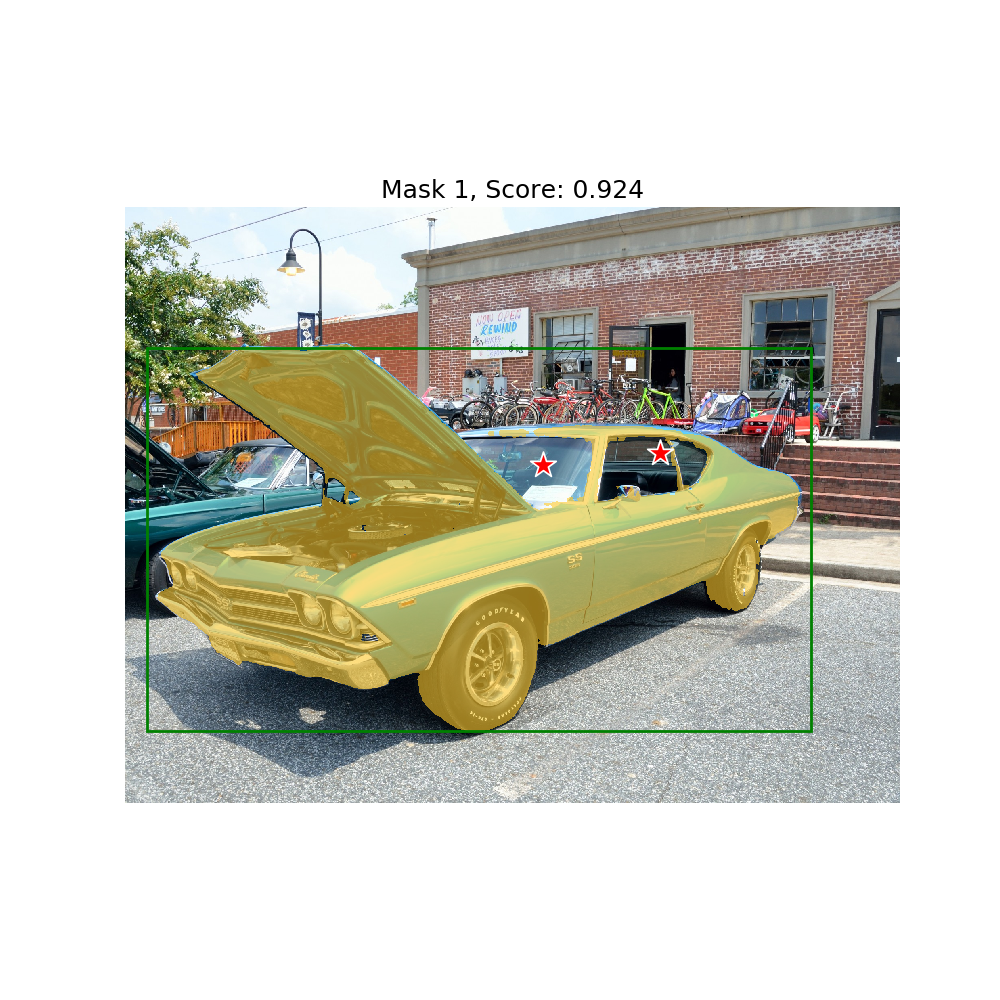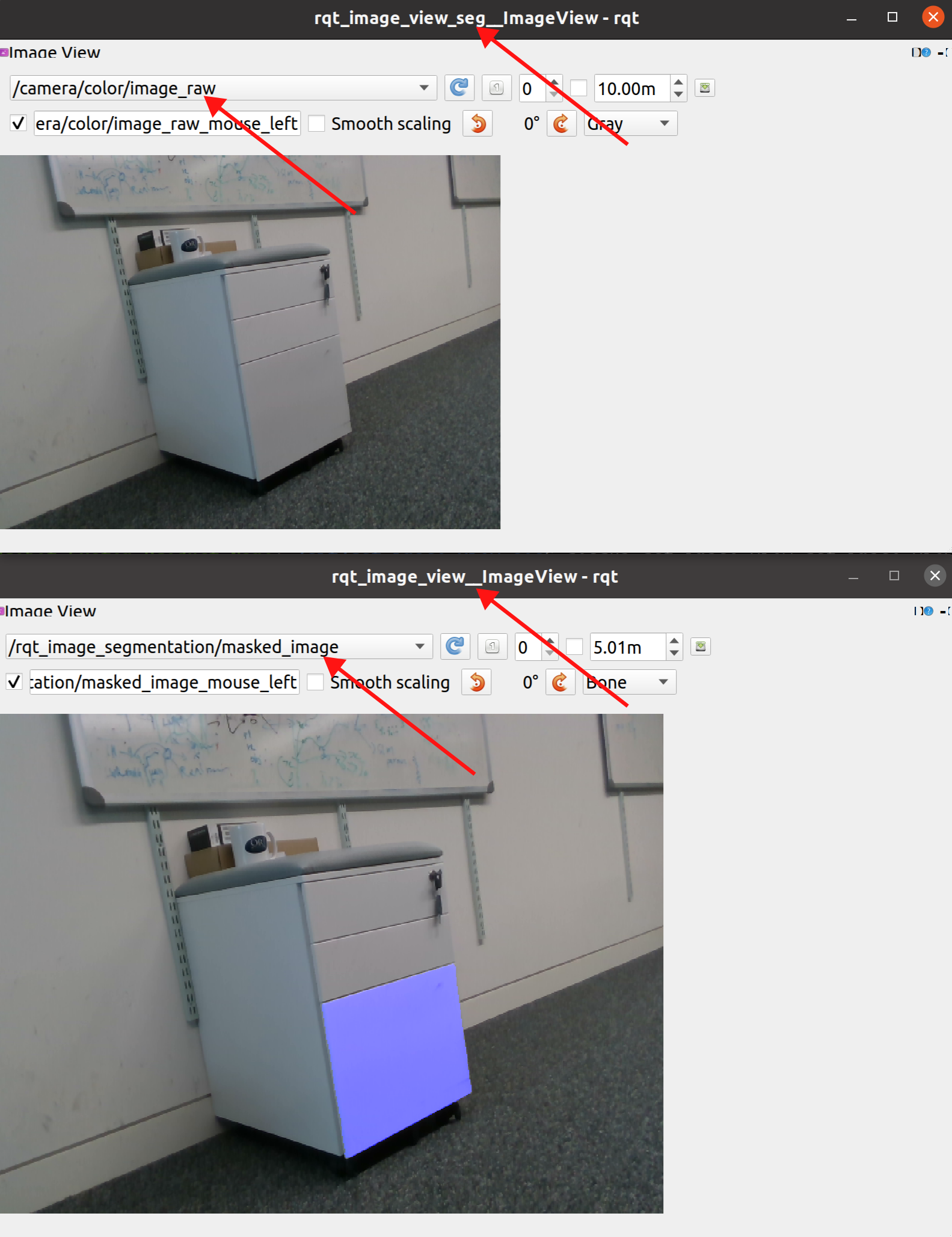This package is what the name suggests: Meta's segment-anything wrapped in a ROS node. In this wrapper we offer...
- ROS services for segmenting images using point and box queries.
- An RQT interface for specifying point queries interactively.
- A Python client which handles the serialization of queries.
Installation is easy:
- Start by cloning this package into your ROS environment.
- Download the checkpoints for the desired SAM models to the
modelsdirectory in this package. - Install SAM by running
pip install git+https://github.com/facebookresearch/segment-anything.git.
Run the SAM ROS node using rosrun:
rosrun ros_sam sam_node.pyThe node has two parameters:
~modelSAM model to use, defaults tovit_h. Check SAM documentation for options.~cudawhether to use CUDA and which device, defaults tocuda. Usecpuif you have no CUDA.If you want to use a specific GPU, set someting likecuda:1.
The node currently offers a single service ros_sam/segment which can be called to segment an image. Check rossrv show ros_sam/Segmentation for request and response specifications.
You can test SAM by starting the node and then running rosrun ros_sam sam_test.py. This should yield the following result:
ros_sam offers a single service segment of the type ros_sam/Segmentation.srv. The service definition is
sensor_msgs/Image image # Image to segment
geometry_msgs/Point[] query_points # Points to start segmentation from
int32[] query_labels # Mark points as positive or negative samples
std_msgs/Int32MultiArray boxes # Boxes can only be positive samples
bool multimask # Generate multiple masks
bool logits # Send back logits
---
sensor_msgs/Image[] masks # Masks generated for the query
float32[] scores # Scores for the masks
sensor_msgs/Image[] logits # Logit activations of the masks
The service request takes input image, input point prompts, corresponding labels and the box prompt. The service response contains the segmentation masks, confidence scores and the logit activations of the masks.
To learn more about the types and use of different queries, please refer to the original SAM tutorial
The service calls are wrapped up conveniently in the ROS SAM client.
To use the GUI install the following in your ROS workspace:
Run the launch file:
roslaunch ros_sam gui_test.launch
Check the terminal and wait until the SAM model has finished loading.
There will be two windows loaded. One will have the header rqt_image_view_seg__ImageView and the other rqt_image_view__ImageView, note the lack of _seg. The first window is where you should click, so select the topic of the camera you want to view from the drop down. In the second window you should select /rqt_image_segmentation/masked_image. This is where the segmented image will be displayed.
Alternatively, if you don't feel like assembling the service calls yourself, one can use the ROS SAM client instead of the service calls.
Initialize the client with the service name of the SAM segmentation service
from ros_sam import SAMClient
sam_client = SAMClient('ros_sam')Call the segment method with the input image, input prompt points and corresponding labels. This returns 3 segmentation masks for the object and their corresponding confidence scores
img = cv2.imread('path/to/image.png')
points = np.array([[100, 100], [200, 200], [300, 300]])
labels = [1, 1, 0]
masks, scores = sam_client.segment(img, points, labels)Additional utilities for visualizing segmentation masks and input prompts
from ros_sam import show_mask, show_points
show_mask(masks[0], plt.gca())
show_points(points, np.asarray(labels), plt.gca())If you use ROS SAM in your work, please cite our paper:
@article{buchanan2023online,
title={Online Estimation of Articulated Objects with Factor Graphs using Vision and Proprioceptive Sensing},
author={Buchanan, Russell and R{\"o}fer, Adrian and Moura, Jo{\~a}o and Valada, Abhinav and Vijayakumar, Sethu},
journal={arXiv preprint arXiv:2309.16343},
year={2023}
}
And please also cite the original Segment Anything paper:
@article{kirillov2023segany,
title={Segment Anything},
author={Kirillov, Alexander and Mintun, Eric and Ravi, Nikhila and Mao, Hanzi and Rolland, Chloe and Gustafson, Laura and Xiao, Tete and Whitehead, Spencer and Berg, Alexander C. and Lo, Wan-Yen and Doll{\'a}r, Piotr and Girshick, Ross},
journal={arXiv:2304.02643},
year={2023}
}

